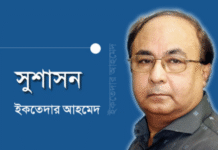Mahmood Hasan
INDIAN Lok Sabha elections came to an end on 12 May, 2014. From the different opinions and hype in the Indian media it appears that the BJP-led NDA will dethrone the Congress-led UPA and form the next government in Delhi. Interestingly, the election campaign has sharply divided the Indian polity into two camps – the secularists and the followers of “Hindutva”. Hindutva has several connotations, but is generally understood as Hinduism mixed with ultra nationalism.
Bharatiya Janata Party (BJP) is led by the controversial Narendra Modi, the Chief Minister of Gujarat. Modi was accused for his complicity in the Gujarat riots in 2002, in which more than 2000 people were killed, mostly Muslims. Rise of Modi as BJP’s Prime Ministerial candidate has alarmed many within and outside of India. Modi has relentlessly played the communal card to polarize the Hindu vote and isolate the Muslim communities. His diatribe against the so-called “Bangladeshi immigrants” was a rude jolt for Bangladesh.
On 27 April 2014, Modi in his election speech at Srirampur (West Bengal) threatened to deport “Bangladeshi immigrants” if NDA came to power. He accused West Bengal Chief Minister Mamata Banerjee for pursuing vote bank politics. He however made a distinction when he said that Hindu migrants from Bangladesh must be accommodated in India. Clearly, Modi too was playing vote bank politics.
Earlier on 30 March in Karimgonj (Assam), BJP president Rajnath Singh warned “illegal Bangladeshi migrants” will not be tolerated and action will be taken against them. People who came from Bangladesh after 1971 should be treated as “illegal migrants”, he said.
On 18 April BJP leader Subramaniam Swamy said in Guhawati that Bangladesh should compensate India with land if it did not agree to take back the so-called immigrants. “According to my estimate, one-third of Bangladesh’s population lives in India”, he added. Thus according to his theory one-third of Bangladesh territory should go to India.
Evidently such statements coming from Modi and top BJP leaders have caused concerns in Bangladesh. Bangladesh civil societies have been discussing this over the past weeks. Some have expressed dismay, some have rejected the threat and some described it as ominous.
Let us see what the BJP manifestos say about the so-called “Bangladeshi immigrants”.
In its 1998 manifesto BJP claimed “The total number of illegal infiltrators from Bangladesh is officially ascertained at over 1.7 crore” and “unabated illegal infiltration from Bangladesh” was the reason for destabilization of North East India. The 2004 document vowed, “Putting an end to infiltration from Bangladesh and vigorously pursuing the 3-D formula – Detect, Delete and Deport”. In its 2009 manifesto BJP said, “We will systematically detect, detain and deport illegal immigrants who have emerged as a major source of homegrown terror”. The 2014 document does not mention Bangladesh but talks about, “illegal immigration across the eastern border” and threatens “punitive measures will be introduced to check illegal immigration”.
The terminologies used by BJP are indeed very confusing. Modi used the term “Bangladeshi immigrants”. He did not say “illegal”. People naturalized as citizens in a foreign country are known as immigrants. Rajnath Singh used the term “illegal migrant”. BJP manifestos have used the terms “infiltrators” and “illegal immigration”. Each of these terms has different legal meanings.
Several questions can be raised here. How did BJP arrive at the figure of 1.7 crore in 1998? Sixteen years later what is the figure now in 2014? Is it on the basis of any census? Has the enumeration been done by checking any identification document? When did India introduce citizen identification cards? Does this figure include only Muslims or Hindus too? Why are Hindus, who left Bangladesh, not considered as “illegal immigrants”? Where are these people living in India?
Even if we accept this figure for the sake of argument – the question is why did these people migrate to insecure India – where communal riots are a frequent phenomenon? Is India better than Middle East – a natural destination for Bangladeshi workers? Are all these 1.7 crore beggars and rickshaw pullers? Could not a single immigrant rise to be recognized in the Indian society as an educated professional during the past four decades – taking 1971 as the cut off date? Haven’t the Bangladeshi Diasporas in Europe, America and elsewhere produced highly qualified professionals?
Bangladesh’s border with India has largely been fenced. The BSF routinely shoot down petty smugglers and cow traders from Bangladesh. If 1971 is the cut-off date—what have the BSF been doing while this so-called 1.7 crore crossed the Bangladeshi border and walked over to India?
When the A.B. Vajpayee-led NDA government came to power in 1998, the Bangladesh “illegal immigration” issue was hotly pursued by some BJP leaders for several months. Scores of Bengali speaking people were herded from slum areas of Mumbai and transported by train to West Bengal for a “push back” into Bangladesh. Ultra Rightist “Shiv Sena” leader Bal Thackeray helped BJP in their sordid ploy. Attempts were made to “push back” some people into the Bangladesh across the border in West Bengal, which was thwarted by Bangladesh. It was the towering Chief Minister Jyoti Basu, who put an end to this woeful affair by warning Delhi that any attempt to send people across the border would be resisted by West Bengal.
Though Mamata Banerjee has no love lost for Bangladesh, she too warned Modi. “Let him touch any person, I will rock Delhi” she declared on 4th May at Ranaghat. She went on to accuse Modi of ignorance about Bengal’s history. She pointed out that during undivided India people came to Bengal to live and Modi was unnecessarily creating a rift between Bengali and non-Bengalis.
Interestingly, there has been no reaction from the ruling party leaders in Dhaka. For obvious reasons, the Bangladesh Foreign Ministry cannot react officially to such utterances of Indian politicians. At least not at this stage, when BJP is not yet a part of the government in Delhi.
Modi has not elaborated on his foreign policy priorities during this election campaign. But some BJP sympathizers are talking about a “Modi doctrine”. Dhaka would be keeping a close eye on who eventually leads the government in Delhi and what its policy will be towards Bangladesh.
If Narendra Modi ascends the throne in Delhi after 16 May, Bangladesh bashing would no doubt be a favourite pastime for some members of the BJP.
Source: The Daily Star










